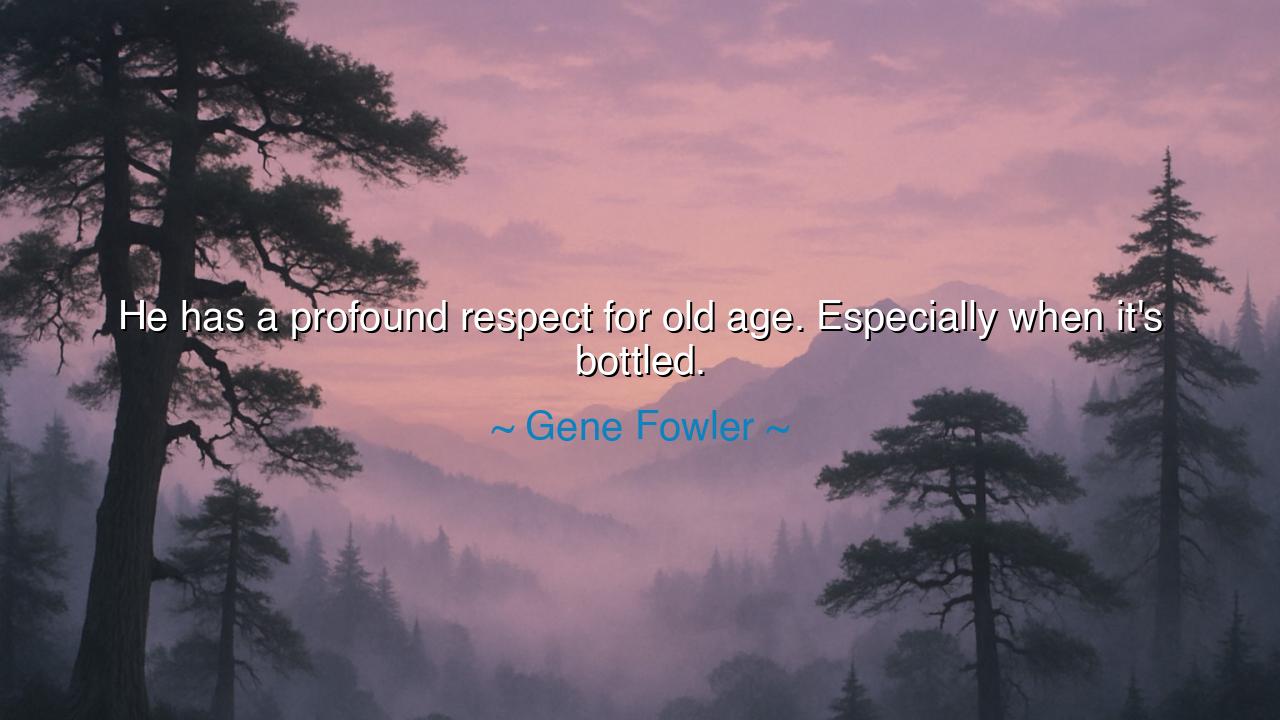
He has a profound respect for old age. Especially when it's






"He has a profound respect for old age. Especially when it's bottled." These words, spoken by Gene Fowler, carry within them both wit and a deep reflection on the nature of age, particularly the way in which society sometimes views old age as something to be cherished only when it is preserved, packaged, and made desirable. Fowler’s words, with their playful irony, suggest that while many speak of a deep respect for the wisdom and experience that come with age, they often seek to preserve it in ways that strip it of its authenticity, reducing it to something commodified and consumed. In this society, we often revere old age not for the life it represents, but for the value it can bring when stored, like a rare vintage or a prized possession.
The ancients, however, had a far different perspective on old age. They viewed it as a treasure—a stage of life to be embraced, honored, and respected. The great philosopher Aristotle, in his work on ethics, considered old age a time of wisdom, a time when the body may grow frail, but the mind becomes sharper, clearer, and more attuned to the true essence of existence. Old age, for the ancients, was not something to be hidden away or preserved in a bottle, but to be celebrated for the wisdom it brought, for the stories it carried, and for the lessons it could impart to those who were still young and eager. Yet, even in those ancient times, the idea of aging as something to be "bottled" for later use was not unheard of, whether it was in the form of wine or the revered knowledge passed down through generations.
Indeed, one might look to the story of Homer, whose epic tales of the Iliad and the Odyssey have survived through the ages. Though Homer himself is often thought to have lived in the later years of his life when his mind was filled with the stories of past warriors and heroes, it was the respect for old age that allowed his works to endure. His stories, passed down over generations, were like wine, bottled and preserved for future generations to drink deeply from, and in doing so, they gained an immortality that no single lifetime could ever bestow. This preservation of wisdom, this bottling of experience and age, speaks to the way the ancients revered the old not for their age alone, but for the treasures they could share, both in word and in life.
In our modern age, however, Fowler's words highlight a certain irony: the more we respect old age, the more we seem to separate it from its living form. Consider the world of fine wine, where the older the bottle, the greater the respect it garners. People speak of vintage wines as though they hold mystical powers, as if their value increases as time goes on. Old age, in this context, becomes something to be preserved in glass, a relic to be admired but never touched. While we respect the aged wine for its complexity, we often overlook the living human whose age could bring equal depth, equal richness, and equal insight into the world. Old age in its natural, untamed form, unbottled and free, is perhaps the most valuable gift one can offer.
Let us turn to the life of Benjamin Franklin, that great American polymath, whose years of experience gave him a sharpness and insight that shaped the very foundation of a nation. Franklin, though aging gracefully, did not seek to hide his years. Instead, he embraced them, allowing them to shape his views, his humor, and his wisdom. Franklin's old age was not confined to a bottle or a shelf; it was an active, vibrant force that propelled him into further achievements. His wisdom flowed from his life experiences, not in the form of something bottled up, but as a wellspring of ideas that sought to improve society. He did not seek to "bottle" his old age, but to live it fully and share it freely with the world.
And so, O children of wisdom, the lesson is clear. While we may respect old age, let us not relegate it to the role of a commodity, something to be admired only in its preserved form. Old age, in its truest form, is to be embraced, to be lived fully, and to be shared with others in all its unfiltered, unbottled glory. There is no need to place it on a pedestal, to hide it away in glass jars or behind walls of admiration. Instead, let old age be a living testament to the richness of life, to the depth of experience that time can offer. It is not the bottling of old age that matters, but the sharing of its lessons, its wisdom, and its gifts that will enrich all who are willing to listen, to learn, and to grow.






AAdministratorAdministrator
Welcome, honored guests. Please leave a comment, we will respond soon